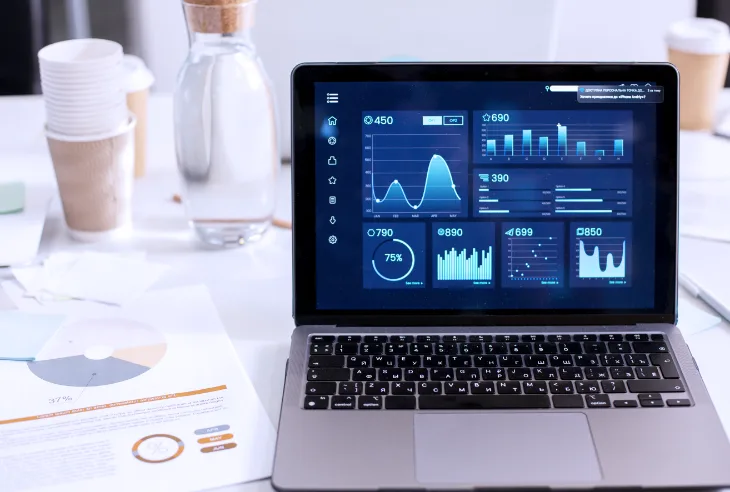What emerging trends in ERP for 2024 ?

In the dynamic landscape of digital transformation, Enterprise Resource Planning (ERP) systems stand as the backbone of modern businesses, orchestrating operations, optimizing resources, and driving strategic decision-making. As we navigate through the complexities of the digital age, it becomes increasingly pertinent to explore the emerging trends and technologies that are reshaping the realm of ERP in 2024 and beyond.
What are the key ERP technologies trends for 2024?
As we peer into the horizon of 2024, the landscape of Enterprise Resource Planning (ERP) systems is poised for significant transformation. A convergence of technological advancements and evolving business needs is driving the emergence of several key trends that will shape the future of ERP solutions.
Artificial Intelligence (AI) and Machine Learning (ML)
AI and ML technologies are poised to revolutionize ERP systems by enabling predictive analytics, intelligent automation, and cognitive decision-making capabilities, empowering businesses to optimize processes, enhance productivity, and drive innovation. A Gitnux report reveals that 53% of market leaders seek more intelligent ERP systems integrating machine learning, AI, and automation, underscoring the rising demand for advanced ERP solutions with intelligent capabilities and highlighting AI and ML's pivotal role in shaping ERP's future.
Cloud ERP
The migration towards Cloud ERP solutions is poised to accelerate in 2024, driven by the need for scalability, flexibility, and accessibility. Cloud-based ERP systems enable organizations to adapt swiftly to evolving business needs, reduce infrastructure costs, and enhance collaboration across geographically dispersed teams. This shift towards Cloud ERP represents a fundamental change in how businesses manage their operations, offering unprecedented agility and efficiency in a rapidly changing business environment.
Internet of things (IoT) and ERP
The integration of IoT devices with ERP platforms presents a transformative opportunity for organizations to enhance operational efficiency and drive innovation. IoT-enabled ERP systems enable real-time monitoring, data-driven insights, and predictive maintenance, thereby improving supply chain visibility, asset tracking, and overall operational effectiveness. This convergence of IoT and ERP technologies is paving the way for smarter, more agile businesses that can quickly respond to market dynamics and customer demands.
Big Data and advanced analytics
The proliferation of Big Data and advanced analytics capabilities within ERP systems is empowering organizations to extract actionable insights from vast volumes of data. By leveraging sophisticated analytics tools, businesses can uncover hidden patterns, identify emerging trends, and make informed decisions to drive growth and competitive advantage. This integration of Big Data and analytics is revolutionizing how businesses operate, enabling them to optimize processes, improve decision-making, and achieve operational excellence in a data-driven world.
Blockchain
Blockchain technology is poised to disrupt traditional ERP models by providing unmatched security, transparency, and trust in data transactions. By integrating blockchain into ERP systems, organizations can streamline processes, enhance data integrity, and mitigate risks associated with fraud, counterfeiting, and cybersecurity threats. This integration of blockchain technology into ERP systems represents a significant step towards creating more secure, efficient, and trustworthy business environments.
Augmented reality (AR) and Virtual reality (VR)
AR and VR technologies are increasingly finding applications within ERP environments, particularly in training, maintenance, and remote assistance scenarios. By leveraging AR/VR capabilities, businesses can improve employee training effectiveness, reduce downtime, and enhance operational efficiency across diverse industries. This integration of AR/VR into ERP systems is revolutionizing how businesses train their employees, manage their assets, and deliver exceptional customer experiences in a digital age.
Data analytics and business intelligence (BI)
The integration of advanced data analytics and BI tools into ERP systems is empowering organizations to extract actionable insights from their data. By harnessing the power of analytics, businesses can gain deeper visibility into their operations, identify areas for improvement, and capitalize on emerging opportunities in dynamic markets. This integration of data analytics and BI is transforming how businesses make decisions, enabling them to drive strategic growth and competitive advantage in an increasingly data-driven world.
The key ERP trends for 2024 encompass a convergence of cutting-edge technologies, including AI/ML, Cloud ERP, IoT, Big Data analytics, Blockchain, AR/VR, and advanced BI tools. Embracing these trends will empower organizations to enhance operational efficiency, drive innovation, and achieve sustainable growth in the digital era.
What are the potential impacts of new technologies on business processes?
The integration of new technologies into business processes heralds a transformative era, offering multifaceted impacts that redefine how organizations operate, innovate, and compete in the global marketplace. Let's delve deeper into the potential implications:
Enhanced efficiency
- The automation of repetitive and manual tasks not only reduces the burden on human resources but also ensures consistency and accuracy in execution.
- By leveraging technologies like robotic process automatiotech (RPA) and AI-driven workflows, organizations can streamline operations, minimize bottlenecks, and optimize resource utilization.
- Real-time monitoring and analysis capabilities enable proactive decision-making, allowing businesses to address issues promptly and capitalize on emerging opportunities swiftly.
Cost reduction
- Beyond labor savings, new technologies contribute to cost reduction through optimized resource allocation and streamlined processes.
- Advanced analytics and predictive modeling help organizations optimize inventory levels, reduce excess stock, and minimize supply chain inefficiencies, leading to significant cost savings.
- The reduction of errors and waste not only improves operational efficiency but also minimizes associated costs, enhancing overall profitability and sustainability.
Better decision-making
- Access to real-time data and sophisticated analytics tools empowers decision-makers to gain deeper insights into business performance, market trends, and customer preferences.
- Predictive analytics algorithms forecast future scenarios, enabling organizations to anticipate market shifts, identify potential risks, and capitalize on emerging opportunities proactively.
- By fostering a data-driven decision-making culture, organizations can enhance agility, responsiveness, and resilience in a rapidly evolving business landscape.
Innovation and value creation
- New technologies serve as catalysts for innovation, enabling organizations to develop novel products, services, and business models that meet evolving customer needs and preferences.
- Enhanced customer experiences, driven by personalized interactions and seamless omnichannel engagement, foster brand loyalty, customer retention, and long-term value creation.
- By harnessing emerging technologies such as augmented reality (AR) and virtual reality (VR), organizations can create immersive experiences, differentiate their offerings, and unlock new revenue streams.
Business transformation
- The evolution of skills and qualifications required in the workforce necessitates investments in training, upskilling, and talent development to ensure alignment with technological advancements.
- Organizations must adapt their structures, processes, and cultures to embrace digital transformation fully, fostering innovation, collaboration, and agility.
- The rise of remote work and digital collaboration tools enables organizations to tap into global talent pools, foster diversity, and drive innovation through cross-functional collaboration.
The potential impacts of new technologies on business processes encompass enhanced efficiency, cost reduction, better decision-making, innovation, and business transformation. Embracing these impacts positions organizations to thrive in a digital-first world, driving sustainable growth, competitiveness, and value creation.
Why is it crucial for businesses to adapt to new ERP technologies ?
In today's rapidly evolving business landscape, the adoption of new ERP technologies is not just an option but a strategic imperative for organizations aiming to thrive and remain relevant. Let's explore the compelling reasons why businesses must adapt to these advancements:
Remain competitive
In an increasingly competitive market, organizations need to differentiate themselves by leveraging innovative technologies. Adopting cutting-edge ERP solutions enables businesses to stay ahead of the curve, offering enhanced capabilities, better customer experiences, and superior operational efficiency compared to competitors.
Improve operational efficiency
New ERP technologies streamline business processes, automate repetitive tasks, and optimize resource allocation, leading to significant improvements in operational efficiency. By eliminating manual inefficiencies and reducing processing times, organizations can achieve higher productivity levels and lower operational costs.
Increase visibility and decision-making
Modern ERP systems provide real-time access to critical business data, enabling stakeholders to make informed decisions promptly. By consolidating data from various departments and functions into a centralized platform, businesses gain enhanced visibility into performance metrics, market trends, and customer insights, facilitating more strategic decision-making processes.
Prepare for the future
Embracing new ERP technologies prepares organizations for future challenges and opportunities in an increasingly digitalized world. By investing in scalable, adaptable ERP solutions, businesses can future-proof their operations, ensuring they remain agile and resilient in the face of evolving market dynamics, regulatory changes, and technological advancements.
Gain agility
Agile organizations are better equipped to respond to changing market conditions, customer demands, and competitive pressures. By integrating flexible ERP systems that can quickly adapt to evolving business requirements, organizations can enhance their agility, responsiveness, and ability to seize emerging opportunities, gaining a significant competitive advantage in dynamic markets.
In summary, adapting to new ERP technologies is crucial for businesses seeking to remain competitive, improve operational efficiency, increase visibility and decision-making capabilities, prepare for the future, and gain agility. By embracing these advancements, organizations can unlock new levels of productivity, innovation, and sustainable growth in today's digital era.
Embracing the future: Key takeaways on ERP trends for 2024
The emerging trends in ERP for 2024 signal a profound shift in how businesses operate and compete in the digital age. From harnessing the power of Artificial Intelligence and Machine Learning to embracing Cloud ERP solutions and integrating IoT devices, organizations are poised to unlock new levels of efficiency, innovation, and agility. These trends not only offer transformative opportunities for improving operational processes but also pave the way for enhanced decision-making, cost reduction, and business transformation.
As businesses navigate the complexities of the modern landscape, adapting to these emerging trends becomes imperative for staying competitive and future-proofing operations. Embracing AI-driven insights, leveraging Cloud infrastructure, and capitalizing on IoT capabilities enable organizations to stay ahead of the curve, drive innovation, and meet evolving customer demands. In essence, by embracing the key trends in ERP for 2024, businesses can position themselves for sustained growth, resilience, and success in an increasingly digital and dynamic marketplace.




 Metam
Metam